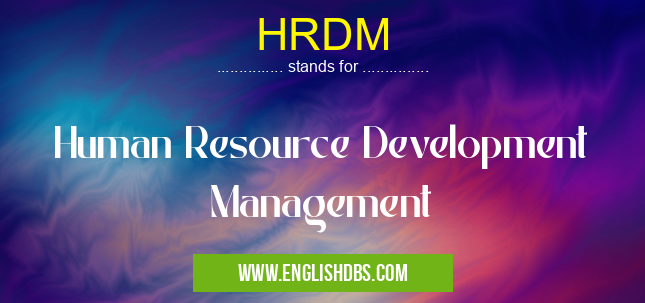What does HRDM mean in DEVELOPMENT
Human Resource Development Management (HRDM) is a specialized field within human resource management that focuses on developing and managing the human capital within an organization. It involves the strategic planning, implementation, and evaluation of programs and initiatives aimed at enhancing the knowledge, skills, and abilities of employees.

HRDM meaning in Development in Community
HRDM mostly used in an acronym Development in Category Community that means Human Resource Development Management
Shorthand: HRDM,
Full Form: Human Resource Development Management
For more information of "Human Resource Development Management", see the section below.
» Community » Development
Key Concepts of HRDM
- Employee Development: HRDM professionals design and execute programs that assist employees in acquiring new skills, knowledge, and competencies to improve their performance and career growth.
- Organizational Learning: HRDM promotes a culture of continuous learning within the organization, encouraging employees to actively seek opportunities for skill development and knowledge sharing.
- Talent Management: HRDM helps organizations identify, attract, and retain top talent by developing comprehensive talent management strategies that align with the organization's business objectives.
- Performance Management: HRDM supports performance management systems by providing training and guidance to managers on effective employee performance assessment and feedback processes.
- Leadership Development: HRDM programs are designed to develop the leadership potential of employees, equipping them with the skills and knowledge necessary to excel in leadership roles.
Benefits of HRDM
- Increased Employee Productivity: Developed employees are more productive and efficient in their roles, leading to improved organizational performance.
- Enhanced Employee Engagement: HRDM programs foster employee engagement by providing opportunities for growth and development, which increases employee satisfaction and motivation.
- Improved Organizational Agility: HRDM helps organizations adapt to changing business needs by developing a workforce that is adaptable, skilled, and ready to take on new challenges.
- Attraction and Retention of Top Talent: Comprehensive HRDM programs make an organization more attractive to potential employees and help retain existing talent by providing opportunities for career advancement.
- Increased Innovation: Developed employees are more likely to contribute to the organization's innovation efforts, leading to the development of new products, services, and processes.
Essential Questions and Answers on Human Resource Development Management in "COMMUNITY»DEVELOPMENT"
What is Human Resource Development Management (HRDM)?
Human Resource Development Management (HRDM) is a specialized field within human resources that focuses on the development and management of employees' skills, knowledge, and abilities. HRDM professionals work to ensure that employees have the resources and support they need to grow both professionally and personally.
What are the key functions of HRDM?
The key functions of HRDM include:
- Identifying and assessing employee training and development needs
- Developing and implementing training and development programs
- Managing employee performance and career development
- Providing employee counseling and support
- Evaluating the effectiveness of HRDM programs
What are the benefits of HRDM for organizations?
HRDM can provide organizations with a number of benefits, including:
- Improved employee productivity and performance
- Increased employee engagement and motivation
- Reduced employee turnover
- Enhanced organizational competitiveness
- Improved return on investment (ROI) in human capital
What are the key challenges in HRDM?
Some of the key challenges in HRDM include:
- Identifying and meeting the diverse needs of employees
- Keeping up with the rapidly changing pace of technology
- Aligning HRDM programs with organizational goals
- Measuring the effectiveness of HRDM initiatives
- Managing the costs of HRDM programs
What are the educational requirements for HRDM professionals?
Most HRDM professionals have a bachelor's degree in human resources management, business administration, or a related field. Some HRDM professionals also have a master's degree in HRDM or a related field. Additionally, HRDM professionals are often required to have certification from professional organizations, such as the Society for Human Resource Management (SHRM) or the Human Resource Certification Institute (HRCI).
Final Words: HRDM is a crucial aspect of human resource management that plays a vital role in the success of an organization. By investing in the development of their human capital, organizations can unlock the potential of their employees, enhance their productivity, and gain a competitive advantage in the marketplace.
HRDM also stands for: |
|
| All stands for HRDM |
